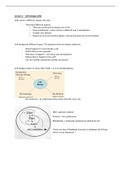College aantekeningen
Experimental Cell biology I minor lecture notes 1-9
These are my lecture notes from all the lectures (except the lecture about the assignment). It contains some pictures from the powerpoint and elaborate explanation of the subjects. Goodluck!!
[Meer zien]




